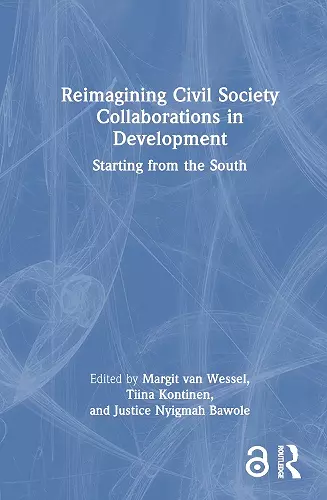Reimagining Civil Society Collaborations in Development
Starting from the South
Tiina Kontinen editor Justice Nyigmah Bawole editor Margit van Wessel editor
Format:Hardback
Publisher:Taylor & Francis Ltd
Published:3rd Jan '23
Currently unavailable, and unfortunately no date known when it will be back
This hardback is available in another edition too:
- Paperback£35.99(9781032147758)

At a time when uneven power dynamics are high on development actors’ agenda, this book will be an important contribution to researchers and practitioners working on innovation in development and civil society.
While there is much discussion of localization, decolonization and ‘shifting power’ in civil society collaborations in development, the debate thus far centers on the aid system. This book directs attention to CSOs as drivers of development in various contexts that we refer to as the Global South. This book take a transformative stance, reimagining roles, relations and processes. It does so from five complementary angles: (1) Southern CSOs reclaiming the lead, 2) displacement of the North–South dyad, (3) Southern-centred questions, (4) new roles for Northern actors, and (5) new starting points for collaboration. The book relativizes international collaboration, asking INGOs, Northern CSOs, and their donors to follow Southern CSOs’ leads, recognizing their contextually geared perspectives, agendas, resources, capacities, and ways of working. Based in 19 empirically grounded chapters, the book also offers an agenda for further research, design, and experimentation.
Emphasizing the need to ‘Start from the South’ this book thus re-imagines and re-centers Civil Society collaborations in development, offering Southern-centred ways of understanding and developing relations, roles, and processes, in theory and practice.
The Open Access version of this book, available at http://www.taylorfrancis.com, has been made available under a Creative Commons Attribution-Non Commercial-No Derivatives (CC-BY-NC-ND) 4.0 license. Funded by Wageningen University.
"This book takes a wonderful approach. Long decades of debate and reform of development cooperation have shown that usually the discussion continues to take the international aid system as its point of departure. This book decentres international efforts by focusing on civil society in Asia, Africa and the Middle East, to understand how they reshape and wish to further reshape international collaboration for development, and what implications this has for roles, relations and processes of development."
Dorothea Hilhorst, Professor of humanitarian studies at the International Institute for Social Studies of Erasmus University in The Hague, The Netherlands
"This timely book enters the fray at a time when the world is struggling to tackle the multiple and overlapping crises that the current system is generating. What do we learn by starting our inquiries with marginalised views, voices and expertise emanating from the Global South? All the authors in this volume invite us to re-imagine how we ‘know’ the world, which is the first step to tackling these persistent global challenges."
Lata Narayanaswamy, Associate Professor in the Politics of Global Development, University of Leeds, UK
"This excellent book is the most comprehensive resource on how collaboration with civil society organisations in the Global South can be reimagined. Virtually every debate taking place in the sector right now is captured in this book, with the authors pointing not only to the dysfunctions in the current system but also pointing to examples of what collaboration could look like, starting from the South. It is impressive in its breadth of analysis, but it is also eminently practical, and is infused with a warmth, humanity and imagination about what could be. Every policymaker, student and practitioner focusing on international development, humanitarian intervention and peacebuilding should read this vital, timely book."
Dylan Mathews, CEO, Peace Direct. Chair, CIVICUS.
"‘Localization’ of aid, when you think about it, is actually quite an outsider’s word. It suggests taking the assets currently held in the North (money, knowledge, power) and somehow transferring them to the South. The value of this book, edited By Margit van Wessel, Tiina Kontinen, Justice Nyigmah Bawole is captured in the subtitle. It discards that idea and asks how CSOs in the South collaborate, both with each other and with funders (both local and international) and what can be learned. In the jargon, it focusses on the existing ‘agency’ of local and national organizations – I’m increasingly drawn to these kinds of ‘asset-based’ rather than ‘deficit-based’ approaches. [...] In terms of the ‘so-whats?’ for outsiders the basic message is that we should be asking ‘How Can We Help?’ and be led by listening hard to the responses to that question from their partners. Is it money? Technical support? International networking? Something we haven’t even thought of? And that may include questioning the word ‘partners’ – ‘the book aims to counteract the bias of seeing Southern CSOs mainly as ‘partners’, viewing them instead as organizations and groups in their own right, embedded in the social and political contexts from which they emerged and in which they navigate.’ Bravo."
Duncan Green, From Poverty to Power
ISBN: 9781032147673
Dimensions: unknown
Weight: 625g
348 pages